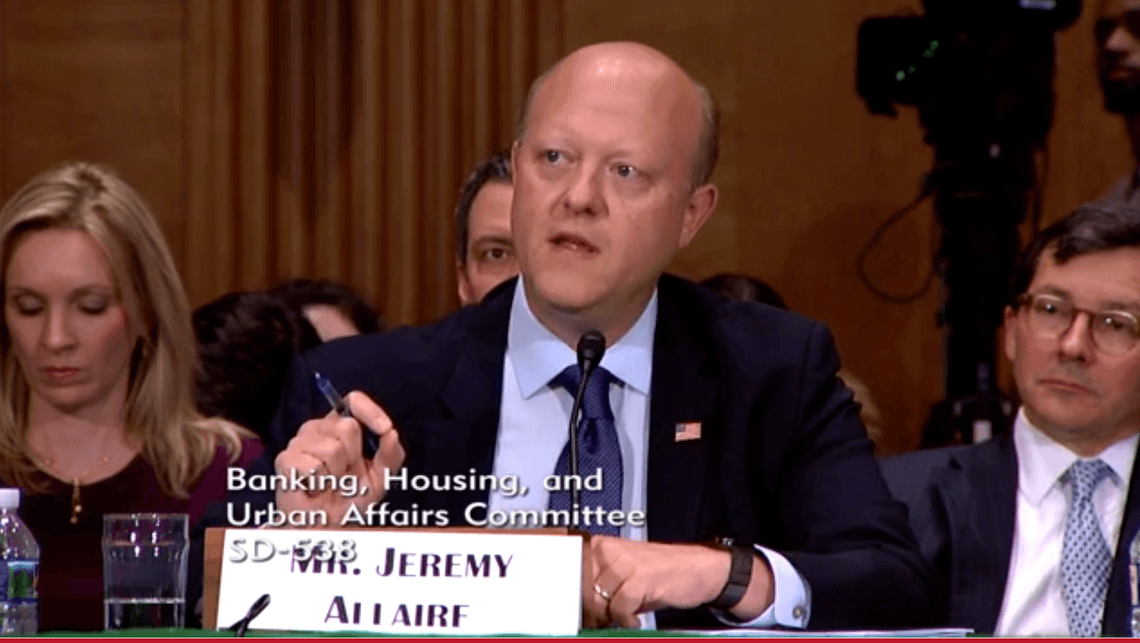Key Takeaways from U.S. Senate’s Latest Crypto Inquisition

Here are key takeaways from the U.S. Senate's latest crypto inquisition, which took place on Tuesday on Capitol Hill. | Source: Shutterstock
Earlier today, the United States Senate Committee on Banking, Housing, and Urban Affairs held a full committee hearing entitled “Examining Regulatory Frameworks for Digital Currencies and Blockchain” to discuss the viability of existing policies and regulations governing the U.S. crypto industry.
Crypto industry executives including Circle CEO Jeremy Allaire were present at the hearing to address issues in the implementation of regulatory frameworks used by the traditional financial sector to provide oversight on the cryptocurrency market.
Circle CEO calls for clear cryptocurrency regulations
At the hearing led by Chairman Mike Crapo, the committee touched upon recent developments in the crypto industry in the likes of the potential launch of the Libra cryptocurrency and regulatory frameworks surrounding the crypto sector, particularly the usage of securities laws to categorize different crypto assets.
Allaire stated that there exists a fundamental mismatch between the current structure of policies the government uses to oversee the crypto market and the nature of cryptocurrencies in general.
Since 2018, the U.S. Securities and Exchange Commission (SEC) has strictly enforced securities laws to regulate the cryptocurrency sector, leading the agency to determine whether a digital asset is considered a security or not.

However, Allaire explained that with the existence of thousands of crypto assets , it is challenging to segregate cryptocurrencies into two categories. He advised that new definitions for cryptocurrencies remain a necessity.
“The really critical issue is that many of these digital assets do not easily fit classifications that we’ve had in the financial system. We’d like to say ‘oh, this is like a currency’ or ‘it’s like a commodity you would use or utilize in some way’ or ‘this has some features that maybe make it look like an investment contract.’ Many digital assets have features of all three. It’s what makes digital assets very innovative,” he said.
In response to the inquiry of Chairman Crapo on the move of some operations of Poloniex, a cryptocurrency exchange operated by Circle, to Bermuda, Allaire noted that other major markets like Singapore and Bermuda are adopting new regulatory frameworks to more practically govern the crypto sector while the U.S. still relies on existing – and outdated – securities laws.
“As I understand it, it’s been recently that Poloniex, the subsidiary of Circle, transferred its registration to Bermuda and cited regulatory uncertainty in the United States which was a primary motivating factor,” Crapo said.
Allaire replied:
“Unfortunately, in the United States, the guidance that the Securities and Exchange Commission (SEC) has given is extremely narrow in terms of what they would deem not to be a security.”
“There is a fundamental mismatch between the regulatory structure and guidance that we have here (in the U.S.) and the nature of these digital assets. Markets around the world are adopting these, not just Bermuda but Singapore, Switzerland, even jurisdictions like France introducing…definitions of digital assets so that issuers can feel comfortable.”
Libra has brought more attention to the sector

The preparation of the Libra Association, a consortium kickstarted by Facebook to create a cryptocurrency called Libra, has brought significant attention from both regulators and mainstream media towards bitcoin and the wider cryptocurrency sector.
Subsequent to some talks on the viability of the current regulatory frameworks for the cryptocurrency industry, the hearing shifted towards Libra and potential risks Facebook’s blockchain ambitions pose to the global financial system.
The Libra Association, incidentally, is based in Switzerland, making it a prime example of U.S. companies fleeing the domestic market in favor of locations more favorable to blockchain businesses.